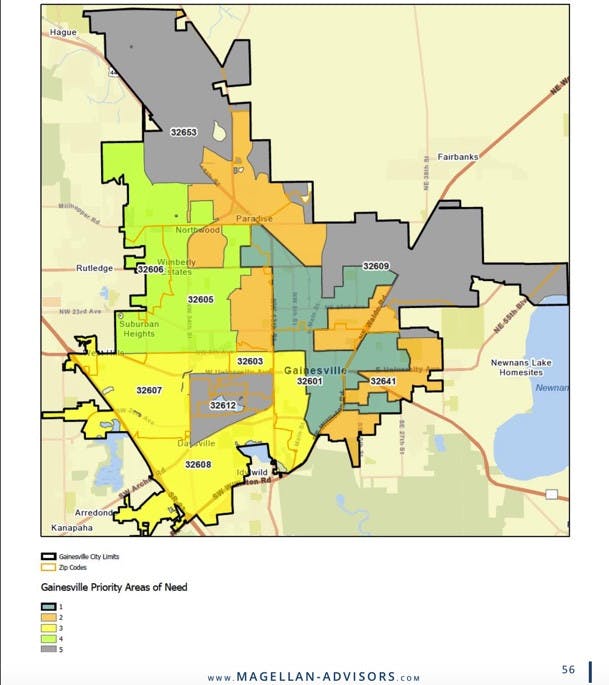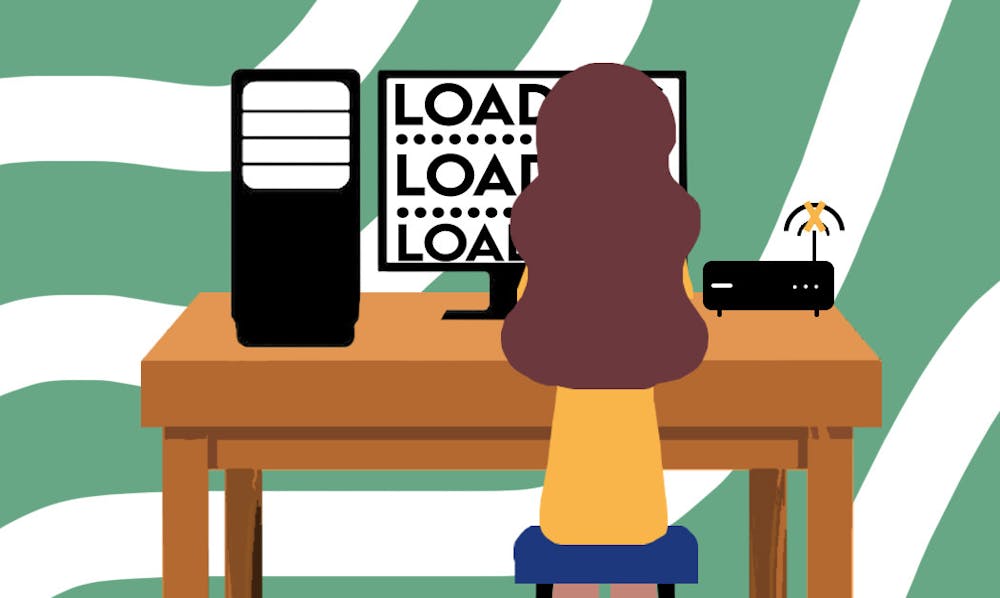Kelly Baker’s wife relies on her phone or tablet to work as a certified nursing assistant in Gainesville. Her mother-in-law also takes classes from home, and her 5-month-old daughter enjoys watching educational videos.
However, the 29-year-old Gainesville resident’s family struggles with its spotty internet provider, Cox and often relies on costly personal hotspots.
“We’ve been managing, obviously, but it’s pretty rough,” Baker said.
To remedy situations like Baker’s, a group of Gainesville residents is pushing to help areas with poor internet service and help increase digital equity across the board.

Bryan Eastman believes publicly-owned internet is the solution to the digital divide — the gap between those with and without reliable technology and internet.
Eastman is an administrator for the Facebook group Connected Gainesville, which advocates for accessible and high-speed internet for the community. He said there are some areas in Gainesville, particularly in East Gainesville, that lack reliable internet connection. The group wants the Gainesville City Commission to supply funding for publicly-owned broadband internet.
The proposal was originally scheduled to be heard by the commission Aug. 25, but the meeting was canceled due to issues related to COVID-19. Eastman said he expects the meeting to be rescheduled to October, where he and other affected citizens will explain why it’s an important initiative.
“It’s internet-owned and operated by the people that use it,” Eastman said. “The same way that our utilities are owned by people who are actually using it.”
About two decades ago, wireless internet connection was considered a luxury, he said. Today, every student, business and home is somewhat reliant on wireless internet. Since the COVID-19 pandemic began, the need for sufficient internet connection has drastically increased.
Eastman sees the internet as a human right in today's digital world and is hopeful that the proposal will pass.
Magellan Advisors, a company that helps plan and build broadband networks for communities, wrote a report on connecting Gainesville homes to better internet connection. The report includes maps of areas most affected by the digital divide.

Magellan Advisors' Map of Gainesville shows which areas are most affected by the digital divide and where the broadband network will come first
It divides Gainesville into five areas of need. The area most affected by poor internet access is in East Gainesville, particularly the
block from 13th Street through to Waldo Road, which is labeled as Priority Area One in the report. The least affected area encompasses North Gainesville, northeast Gainesville and UF’s campus.
According to the report, a broadband network is an eligible use of the American Rescue Plan Act funding, which was signed into law March 11 with the goal of relieving economic and health effects from the pandemic. The city will receive about $32 million, and an estimated $12 million could fund the start of the broadband network in the area most affected by the digital divide, according to the report.
Eastman believes this plan would greatly benefit those who live in Gainesville’s low-income areas and communities of color.
“The issues are devastating for kids who aren’t able to get the education that they need on the internet,” Eastman said. “Especially if we are moving more and more toward a digital-based education system.”
He said Cox has been the sole provider of internet in Gainesville for too long and described it as a “monopoly.” Although AT&T is becoming available in some areas, he would like to see a shift away from privately-owned internet companies.
However, companies like Cox Communications, Inc. remain skeptical at the prospect.
Cox spokesperson Cam Johnson describes publicly-owned internet as a “risky and expensive endeavor.” Citing a 2021 Neighbors Survey, he explained the money spent on building and operating a broadband network could be better used on different issues residents are concerned with such as racial equality, policing standards, affordable housing and cost of living.
Cox services 99% of the homes and businesses in the city and expanded its network by 50% in 2020, Johnson said.
Gainesville residents like Baker are trying to shy away from Cox, complaining they have issues with spotty connection.
Baker tried to switch services to AT&T, but her area is not eligible yet. Much of East to southeast Gainesville only has one or two available internet providers, while areas around the UF campus and West Gainesville have up to five providers to choose from, according to BroadbandNow’s map of internet providers in Gainesville. Cost of internet service is a big issue for her family, and her home resides in the second-most affected area in the Magellan Advisors report.
“All we need is just internet,” Baker said. “We were paying [Cox] over like $150 a month for services we weren’t using.”
Baker said publicly-owned internet would benefit her family. She would be able to fill out job applications and stay connected with her potential employers, her wife could work as a certified nurse assistant more easily, and her daughter could grow up with the technology and learning resources she needs.
Contact Troy Myers at @tmyers@alligator.org or follow him on Twitter @Troy_Myers1.

Troy is the criminal justice reporter and a fourth-year journalism major with an outside focus in business administration. He previously studied accounting for two years at Santa Fe College but has since transferred to UFCJC. When Troy isn’t writing, he enjoys going to the beach and spending time with his dog, identical twin brother and family.






